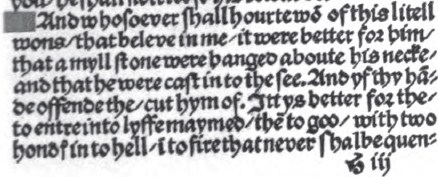Tyndale’s Translation of Mark 9:42-43


This coming Sunday I’ll be continuing with my series on Mark. We’ve come to Mark 9:42-43. I ended up doing a bit of study into the Greek noun ‘skandalon’ and its verbal relative ‘skandalizo.’ That led me to William Tyndale and his introduction of the expression “stumbling block” into English Bible translation. He didn’t actually use “stumbling block” or anything like it in Mark 9:42-43. I’m not sure exactly what word he used. Have a look for yourself. The word in question is the fourth word in, “And whosoever shall…” It looks like “hourtewd.” Never heard of that word before. Can anyone help?



I cannot help, but perhaps Dr. Bill Helder would have an idea.
my guess would have been an old english version of “hurted.”
but i’m no scholar. 🙂
hope you find the answer!
I with Cecilia; whoever shall “hurt” one of these little ones.
The Tyndale translations I look at show that word as being “offende” which might work if you say “hourtmed” in a booming thick old-english accent.
What I reproduced was from a .pdf of a facsimile of the 1525/26 edition. It can be found here:
http://books.google.com/books?id=drIOAAAAQAAJ&printsec=titlepage
Jan,
I think you may have been looking at this. Apparently that is a 1534 edition. Perhaps this word was changed between 1525/26 and 1534.
I also looked up the word at the Lexicons of Early Modern English site and didn’t come up with anything for ‘hourtewd.’ There was an entry for ‘hourt’; it is defined as a boisterous encounter or violent conflict or shock.
What looks like “hourtewd” is really “hourte” plus “won,” which is the author’s spelling of “one.” The d is actually an o. What you see above the o is a mark or squiggle indicating that the word is abbreviated—the kind of thing found very frequently in medieval documents. (Note that in the next line “wons” is the spellling used for “ones.” Won = one. Wons = ones.)
Thanks! That makes sense. I had recognized that convention elsewhere in this passage, but thought the first ‘d’ looked like this one. The early European/medieval orthography can be confusing. Throw in obsolete (to us) words and unregulated spellings and it becomes even more so.
I came across those abbreviations many times when I transcribed the book of Revelation from the 1560 Geneva Bible into a more modern format. You can see another example in the second last line above, where the line over the ‘e’ in ‘the’ means to add an ‘n’ at the end of the word.